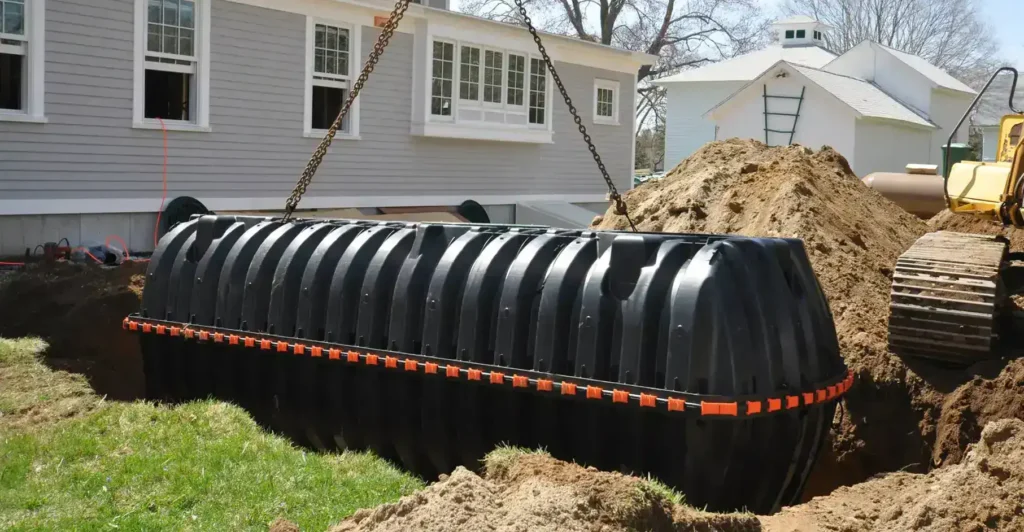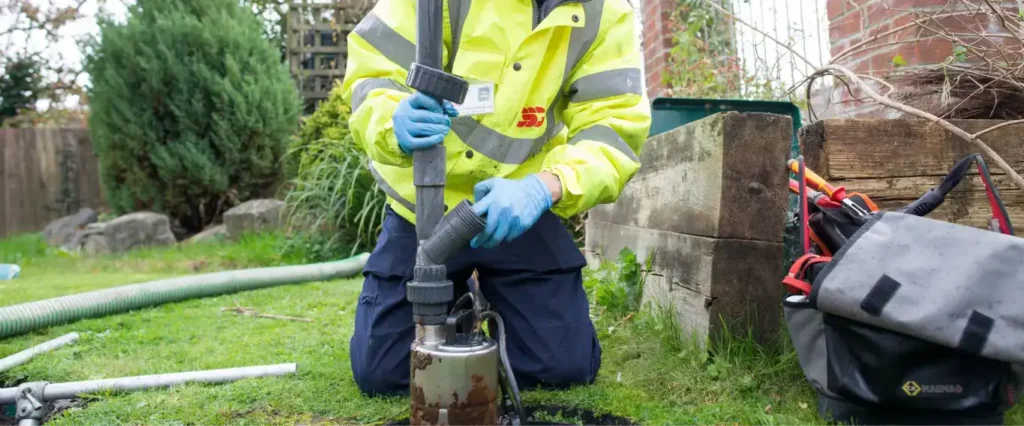Wastewater system Septic tank pumping is a vital requirement for maintaining system efficiency. The tank develops increased waste accumulation over time. When waste remains in the septic tank without pumping, it leads to blockages and unwelcome odors. Regular septic tank pumping creates a solution to prevent mechanical issues, resulting in future financial benefits.
Motorists pay anywhere from $255 to $600 for septic tank pumping services. The average septic tank pumping service cost is $400 for homeowners. The total price for septic tank pumping services relies on tank dimensions and other optional support services.
| Low | Average | High |
| $255 | $400 | $600 |
How Does Septic Tank Pumping Cost Differ By Add-Ons?

The cost of septic tank pumping varies based on supplementary services, often referred to as ‘add-ons.’ Cleaning tank filters and system inspections are additional services that can increase the total cost. These extra services contribute to the overall expense during the visit.
| Add-On | Average Cost |
| Additives | $20 – $200 |
| Clog Removal | $1,700 |
| Field Aeration | $10,000-$20,000 |
| Inspections | $685 |
| Maintenance | $100-$1,000 |
| Overflow Cleanup | $7-$15 per square foot |
| Repairs | $100-$4,000+ |
How Does Tank Size Affect Septic Tank Pumping Prices?

The price to pump your septic tank depends mostly on the tank’s size. Tank size is a major determining factor for average pumping costs nationwide, as shown in the table below.
| Size (in Gallons) | Cost |
| 750 | $175-$300 |
| 1,000 | $225-$400 |
| 1,250 | $275 – $500 |
| 1,500 | $345-$600 |
| 1,750 | $400 – $700 |
Factors Impacting Septic Tank Pumping Cost Estimates
The total price of septic tank pumping depends on your pumping frequency, location, tank maintenance procedures, and capacity.
- Frequency: Large households should pump their septic tanks once every two years to reduce waste accumulation in the system. In most cases, this should happen every three to five years.
- Location: The costs involved in septic pumping dispatch can be substantial, depending on the local district where you live. Boise residents who need tank pumping will spend about $200, but Portland residents face fees higher than $800.
- Maintenance: Well-maintained septic tanks avoid expensive maintenance needed for corrective work. Regular pumping of tanks in proper time enables early identification of issues so property owners save costs over the long term.
- Tank Size: Pumping expenses reflect how much waste a tank holds, with larger tanks needing extra costs but smaller tanks requiring inexpensive service.
- Additional Services: Appendix services like filter cleaning and system checks add to the total billing amount.
Benefits of Septic Tank Pumping
Active septic tank pumping maintains regular operation and provides multiple vital advantages to your system. Regular cleaning can reduce the need for extensive repairs, prevent emergencies, and safeguard your drinking water from contamination.
- Avoiding unnecessary expenses: Frequent septic system pumping protects your budget by preventing expensive maintenance problems, such as tank damage and clogs, and landscape-ruining overflows. Regular maintenance saves you money by helping prevent these costly problems.
- Preventing Nasty Emergencies: Failure to pump your septic tank regularly can cause sewage to reverse into your home drains, resulting in foul odors and unappealing conditions. The consequence of delayed pumping is twofold: it creates difficult-to-clean blockages and significantly worsens overflow problems.
- Preventing Water Contamination: Having a sound system as your home’s water source requires routine septic tank pumping. When your septic tank reaches its maximum capacity, waste will contaminate your drain field, and groundwater damage will occur. Testing your healthy water source remains crucial for safety even when you practice routine septic tank pumping.
Choice Between Experienced Experts and Self-Performed Septic Tank Cleaning

Homeowners must decide between using professional septic tank pumping services or doing it themselves when maintaining their septic system. Different options present positive and negative aspects before selecting one.
Professional Pumping:
- Expertise: Experts understand proper tank evaluation and pumping techniques that avoid causing harm to the tank system.
- Safety: Professional staff use specialized equipment to conduct safe waste removal operations. They are experts at resolving tank issues such as blockages and leaks.
- Convenience: Hiring professionals can save you time and labor as they manage each step, from draining operations to waste removal cleanup.
Cost: The higher expenses yield guaranteed quality work and protect you from paying high costs related to improper tank management.
DIY Pumping:
- Cost Savings: Doing it yourself cuts labor expenses, but you must acquire or lease the equipment required for the job.
- Physical Labor: Pumping sewage tanks requires a heavy physical workload and produces unpleasant messes that require substantial physical effort.
- Risks: If you lack expertise in septic tank pumping, you risk generating costly mistakes, including tank damage and overflow, which require expensive repair work.
Experts must handle septic tank pumping because of the technical difficulty and safety hazards.
Hiring a Professional for Septic Tank Pumping
Hiring a professional for septic tank pumping comes with several key advantages:
- Expertise and Experience: Professionals have received training to service septic systems effectively and safely. They assess your tank condition and ensure you are pumping correctly to avoid future dilemmas.
- Proper Equipment: Recognized professionals carry equipment and tools that clean and thoroughly empty septic tanks. Professional equipment delivers effective waste removal and prevents damage to tank materials.
- Time-saving: When you hire a professional, you eliminate the need to handle the tasks yourself physically. They manage the complete dumping process, allowing you to dedicate time to other work.
- Preventative Services: Besides tank pumping services, some septic company experts inspect your system and conduct minor on-site repairs. One benefit of professional services is identifying minor system concerns before they develop into more expensive problems.
- Compliance with Regulations: The professionals handling the pumping process ensure that everything follows local health and safety regulations, thus preventing possible fines and legal problems.
Hiring professional services will initially cost you, but servicing your septic system proves safer and more efficient.
How to Save Money
Saving money on septic tank pumping involves a few key strategies:
- Regular Maintenance: To prevent significant problems, you should regularly pump out your septic tank. System failure and expensive repairs become less likely when you maintain regular pumping schedules. Repetition of septic tank pumping should occur every 3 to 5 years relative to your family members.
- Avoid Flushing Non-Biodegradable Items: Do not discard objects such as wipes, battery waste, or chemicals through the toilet, as they create tank clogs that lead to extra pumping sessions.
- Fix leaks and maintain the system: Testing your pipes and storage units for leaks must become part of your regular environmental maintenance routine. Fix these minor problems immediately to stop them from developing into expensive maintenance work.
- Get Multiple Quotes: Professional service costs should start from multiple plumbing businesses to confirm that you receive honest job rates.
- Use add-ons wisely. To save money, ge additional services, such as tank cleaning or inspection, only when necessary. Installing additional services without need will increase total maintenance costs.
Organized maintenance and preventive measures will let you operate your septic system well, all while controlling your spending.
Final Words
Regular septic tank pumping is essential for the operation of your septic system. This process protects the tank against backups and clogs while preventing damage. Regular pumping also saves money by avoiding expensive repairs.
Septic tank pumping services typically range between $255 to $600. Tank pricing depends on both size and the site location—the investment of routine pumping costs little to secure your home and preserve ecological integrity.
FAQS
Q1. How often should a septic tank be pumped?
A septic tank needs to be pumped every 3 to 5 years. However, this depends on factors such as the size of the tank, the number of people in the household, and usage. More populous households require more frequent pumping after 2 to 3 years.
Q2. What are the indications that show your septic tank is full?
Common signs that your septic tank is complete include:
- Toilets, sinks, or tubs take a long time to drain.
- You have noticed foul odors around your yard or inside your house.
- Water collects in the yard over the area of the septic system.
Q3. What is the most expensive part of a septic system?
The drain field, or leach field, is typically the most costly component of a septic system. It involves digging and piping materials to remove wastewater, and it can be expensive to repair or replace.
Q4. What happens if you never pump out your septic tank?
If you never empty your septic tank, the waste within can eventually become too solid, clogging the drain field. This can cause backups and potential system failure, resulting in expensive repairs and environmental issues.


